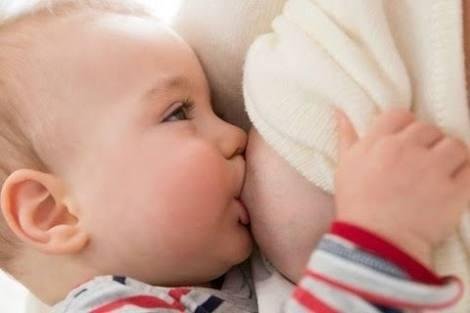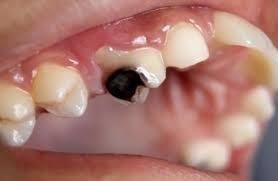
To avoid porous teeth, plural parents forbid their children to eat a lot of candy or chocolate. However, studies in Brazil have recently shown a link between the holes in the teeth and the consumption of breast milk.
This was revealed by research Karen Glazer Peres, et al of 1,129 children in Pelotas, Brazil. Peres showed breastfeeding for more than two years increased the risk of severe tooth decay in children. Dental examination when they were five years old found tooth decayed teeth, toothless, and severe caries in early childhood (damaged tooth reaches six or more).
A total of 23.9 percent of children had severe hollow teeth and 48 percent had at least one hollow tooth. It was concluded that children who were breastfed for more than 24 months had a risk of tooth decay 2.4 times greater than children who were breastfed for up to 12 months. As for breastfeeding between 13 to 23 months have no effect on dental caries.

However, is it true that ASI per se is the cause of tooth decay? In the study, it was mentioned that breast milk has a sugar (lactose) is higher than the formula milk that tastes not sweet. However, the study also points to other factors that increase the risk of tooth decay.
In addition to long exposure to breast milk, there are socioeconomic factors that also increase the risk of dental caries: low levels of income and education. Possibly, this socioeconomic factor affects parents' knowledge of the importance of brushing their teeth before bed.
"Normally children breastfeed at night. It would be hard to ask them to brush their teeth on the sidelines of their sleep, "said Dr. Karen Peres, lead author of the study and professor at the University of Adelaide in Australia.
However, Peres stresses that this study is likely to apply only in Brazil and not in other countries. For additional information, he stated that Brazilian tap water since 1962 has contained fluoride which can prevent tooth decay.
"This study is only for populations with similar patterns of breastfeeding and fluoride exposure," Peres said.
However, other studies in Germany and Italy have also confirmed similar findings. Children will have a higher caries risk when raised by low-income parents, breastfed for more than two years, and put on a bottle of milk until they sleep.
Do not Miss Toothbrush
Although the results show an increased risk of dental caries in long-term breastfeeding, it does not mean Peres et al banned breastfeeding. Their study also shows that breastfeeding 13-23 months did not significantly affect the risk of cavities in children.
Therefore, we should stick to the WHO recommendation of breastfeeding, namely breastfeeding babies until at least up to two years. Breast milk provides various benefits such as reducing the risk of infectious diseases, ear infections, diarrhea and even death. Breastfeeding mothers are also quicker to return to weight before pregnancy, while reducing the risk of ovarian and breast cancer.
In addition, breastfeeding is also economically profitable. With simple reasoning, we can imagine the cost to be incurred if the child is fed formula, rather than breast milk. For the first year, assuming the price of many purchased formula such as SGM, parents must spend Rp3, 6 million.
Not to mention if we calculate the benefits of breastfeeding: children avoid various diseases. Healthy children mean profits for the family and state economy. Families avoid extra spending when children have to be hospitalized, state finance is also not much leaked if the citizens are healthy.
What parents need to do is pay more attention to the dental health of children. Ruchi Sahota, dentist and spokesperson for the American Dental Association, provides tips on keeping a child's teeth.
The parents, he said, can prevent the teeth of children hollow from an early age. The trick is to wipe (clean) baby gums with a clean cloth moistened with boiled water after breastfeeding. Then, do not forget to brush their teeth twice a day when his teeth begin to grow, in addition to routine dental health checks on the doctor. Dental examination is recommended when the first tooth grows.
"Because breast milk contains sugar, so baby likes it, so we should take care of it," Sahota told CNN.
He also reminds parents to keep their teeth clean, because the bacteria on the teeth can move when parents and children share food. Especially when using an intermediary like a spoon.
Regarding the duration of breastfeeding, we can conclude that the safest-if referring to Peres's research-is weaning children when they are 2 years old. However, if you still want to breastfeed children until they are bigger, you must be disciplined. Do not feed them before bed, let alone until they fall asleep and skip a toothbrush.
Before going to bed, children's teeth should be brushed by using fluoride toothpaste-as much as the size of the rice seeds if they are not yet 3 years old, and as much as the size of the soybean seeds for children aged 3-6 years.



follow me friends and follow back
Downvoting a post can decrease pending rewards and make it less visible. Common reasons:
Submit
okay
Downvoting a post can decrease pending rewards and make it less visible. Common reasons:
Submit
great post, suheri as usual!
Downvoting a post can decrease pending rewards and make it less visible. Common reasons:
Submit
thank
Downvoting a post can decrease pending rewards and make it less visible. Common reasons:
Submit